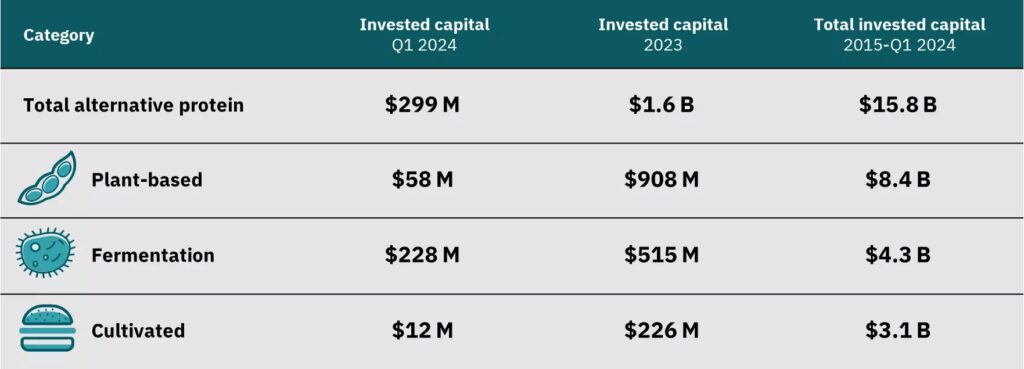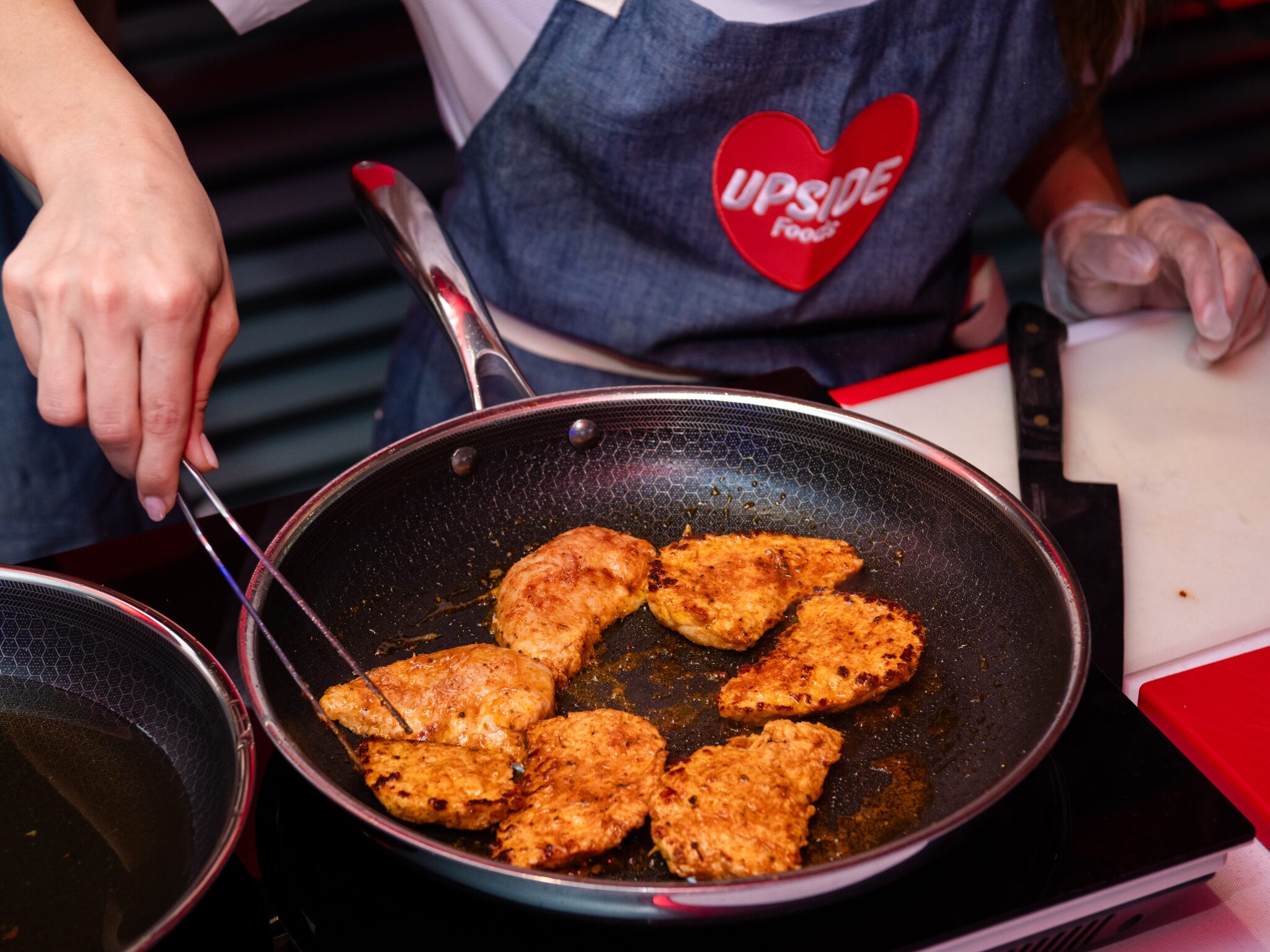5 Mins Read
Californian cultivated chicken maker Upside Foods has conducted a round of layoffs as it looks to overcome financial and legislative obstacles.
Leading cultivated meat company Upside Foods – one of only two to be approved for sale in the US – has made some cutbacks to its workforce, citing “political, regulatory and macroeconomic headwinds”.
First reported by Wired, Upside Foods co-founder and CEO Uma Valeti told employees in an email that 26 people would depart the startup, and that the executive and leadership teams would be restructured to “reduce top-heavy structures”.
“Our focus must now narrow to a tighter set of priorities that pave the way for our product launches in the next two years,” Valeti wrote. “We need to deliver on the work that remains, especially on critical milestones that are yet to be hit or are delayed.”
The development comes days after Upside Foods held a public tasting for its cultivated chicken in Miami, in response to Florida’s then-impending ban on cultivated meat within state borders. The legislation came into effect on Monday, making it a second-degree misdemeanour to manufacture, transport, commercialise or sell these proteins.
The event featured a “public offer to engage with the governor and the government of Florida to learn about and experience cultivated meat at a place of their choice”, according to Valeti.
“Uncertainty related to political, regulatory and macroeconomic headwinds requires us to be even more deliberate and conscious with our focus and resources,” Valeti wrote in the email. A host of US states are considering restrictions on cultivated meat – a week after Florida’s ban, Alabama followed through with its own.
A rollercoaster year for Upside Foods

This is the second round of layoffs made by Upside Foods this year, with the Californian startup making “selective role eliminations” and “other changes” impacting 16 people in February.
“Upside is focused on our next chapter of scale and commercialisation. To stay agile in the face of an uncertain macroeconomic environment and preserve the resources needed to reach our milestones, we made the difficult decision to eliminate a number of positions,” a company spokesperson told Green Queen.
“We’re deeply grateful for the hard work, commitment, and dedication of our departing team members and remain steadfast in our mission to bring cultivated meat to the world.”
The last 12 months have been a rollercoaster period for Upside Foods, which is among the best-funded startups in the cultivated meat industry, having raised $608M to date. The company became the first to serve cultivated meat in the US through a partnership with Bar Crenn in California – that partnership has since ended, but Upside Foods is now focusing on serving its chicken at public events.
The company broke ground on a commercial-scale facility in September last year, but decided to pause construction in February to focus on its existing pilot plant instead.

It has also been the subject of a swarm of negative press, most notably in Bloomberg, which published a scathing story about Upside Foods and the cultivated meat sector, but made a number of misleading and inaccurate claims and failed to address a lot of the progress made by the industry.
In response, the alternative protein startup outlined how Bloomberg “ignored our repeated requests (and blog post)” that stated its whole-textured tissue is not ready to scale in the near term. The company’s debut product was a whole-cut chicken, but it is now focusing on commercialising suspension products, which include chicken nuggets, pâtés and other ground meats.
But Upside Foods’ move to adjust its strategy is a good sign, according to Steve Molino, principal at impact investment firm Clear Current Capital (which is not an investor in Upside Foods). “Too often we see companies wait until it’s too late to make difficult changes,” he told Wired.
In a statement sent to Green Queen, Valeti said: “We are being proactive, as Steve Molino said. We are laser-focused on getting to scale. I am happy my statements were written there without twisting them.”
Cultivated meat rocked by financial and political trials

The latest round of layoffs follows similar trends across the cultivated meat industry. Last month, it was reported that Israel’s Aleph Farms – another leading startup that has been approved to sell cultivated meat – let go of 30% of its local workforce.
“As we transition towards larger-scale production and commercialisation, we are maintaining R&D and production in Israel while expanding globally through co-manufacturers, in line with our capital-efficient and asset-light approach. We are adapting our organisation to align with this next growth phase,” an Aleph Farms spokesperson told Green Queen, reflecting Upside Foods’ reasons for the layoffs.
In California, cultivated seafood producer Finless Foods had similarly carried out two rounds of layoffs in less than 12 months, while Omeat stripped back its employee count by 80%, with its founder stepping down as CEO amid allegations of creating a hostile work culture.
This all comes amid a sharp decline in the venture capital flowing into cultivated meat. Last year, investments were down by 75%, as part of a wider dip in food tech and overall VC funding. The sector hasn’t recovered yet, with the first quarter of this year seeing only $12M being pumped into cultivated meat startups (5% of the $226M invested last year).
This is why AgFunder has earmarked cultivated meat as a “category to watch” this year. This has been exacerbated by the legislative challenges in a critical political year when half the world will vote – before Florida, Italy banned cultivated meat, with France and other European countries mulling similar laws.
With the far-right gains in the EU elections (and now France), and the recent boosts to climate-sceptic Donald Trump’s US presidential candidacy, the impact of policy on alternative proteins may yet cut deeper. Upside Foods itself fought back with its Miami tasting – but even there, the meat lobby was out to keep up its misinformation campaign. Valeti described it as a “protest truck parked outside unsuccessfully trying to detour folks in line”.
These hurdles have also forced some companies to cease operations. Cultivated pork startup New Age Eats shut down in March 2023, and hybrid meat startup SciFi Foods began selling off its assets last month.
“The funding environment is as closed as I’ve ever seen, so only a select few in the cultivated space will be able to keep pushing for progress,” warned Molino, suggesting that there could be more closures in the sector this year.



